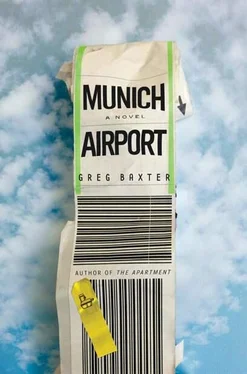Oh yeah?
And I found the dress she wore the last time we met.
When was that?
Years ago, in Cologne.
He leaned back and looked up at the ceiling. Then he said, It’s funny, I haven’t seen some of these people in many years, I don’t even know some of them.
Do you think they will come?
I have no idea.
Did they get back to you?
No, nobody.
He sipped his beer, then lit a cigarette. Then he said, I can’t stay too long, either.
I think I must have sighed, or rolled my eyes, because he said, Sorry, I couldn’t get out of something else.
The door opened and a couple came in, a really handsome guy and a handsome, brown-eyed woman, nicely dressed. I was facing them, but I had to lean to see past Otis’s head. Otis, whose back was facing the door, had to twist to look at them. The couple took a look around. Perhaps they saw too many empty seats, or they didn’t appreciate the reception Otis and I had given them. They turned around and walked out.
We’ll be going back soon, I said.
To the States?
That’s right.
Any word on Miriam?
Nothing yet.
Then how do you know?
It’s a feeling. I get feelings about things.
Are you looking forward to going home?
I wouldn’t say so, no.
Then back to London?
That’s the plan. Except…
Otis leaned forward, waiting for me to finish, and I reckon the only reason he didn’t speak — to say, for example, Except what? — was that I must have looked like I was going to finish. I was trying to. I was really concentrating. The explanation felt entirely within reach, except that it wasn’t, it wasn’t even close.
A little while later, a woman named Ulrika arrived. She was an artist, and she was from a little town in Austria. She had round blue eyes, small shoulders, pretty freckles, and brown hair. She had really big thighs and fat hips, but she was skinny from the waist up. She didn’t seem to have much interest in Otis. She drank whiskey as well, and smoked long thin cigarettes, and talked about herself and her art quite a bit, which was fine with me, because Otis and I hadn’t anything to talk about. She had just been to India and Malaysia. Oh, she said, journalists won’t stop calling her, journalists, journalists, journalists. She did not know how Miriam had died. The last time they spoke was years ago. But you came this evening? I said. Yes, well, I never knew anyone who died, she said, except for the very old or the very sick. She was intrigued, said Otis. When we told her that Miriam had starved, she became really intrigued, and requested that she be allowed to view the apartment. It’s too late, I said, I’ve rearranged everything. Yes, she said, but you’re the brother, your rearrangement will be very interesting. I doubt it, I said. He’s in marketing, said Otis. I finally had a sip of my whiskey. I tried to calculate how much whiskey I could drink before I got sick, and whether that would be sufficient to get drunk. Then another old friend arrived, a nice woman named Anna. She knew that Miriam had died, and she knew how, and she sat very quietly and asked how I was, and she asked how Otis and Ulrika were, and they tried to come up with answers that — it seemed to me — made them sound as though they had been left reasonably broken-hearted by Miriam’s death. Anna was German. She had long blonde hair. When she took off her jacket, and then her cardigan, she had bare arms, and there were large scars on both of them, surgery scars, and I suspected — it turned out I was right — she had been in a crash at some point. She worked in a travel agency — Germans still use travel agents heavily, she said — and she knew Miriam from long ago, when they were both doing evening courses in French. She stopped. Maybe the first course was Italian, she said. They did a few courses. Miriam had a gift for languages — her German was flawless, by the way — but she did not travel. Anna asked what we’d been doing, how long we had been here. Before I could answer, Ulrika started a conversation about hunger, and how, with respect, she felt that starving oneself to death was an insult to the many people who were starving involuntarily across the globe. She said, It is also an insult — forgive me for saying so — to starve herself in a country where Jews were put in ghettos and camps and starved. Otis said, A lot of those Jews were gassed before they starved. I said, Miriam was Jewish. I wanted to see what would happen if Ulrika’s sense of justice and rectitude were confronted with an inconvenience, but I felt a little strange saying it, even just joking about it. That’s absurd, said Ulrika. I said, Whatever, it’s the truth. Are you serious? she asked. Ulrika turned to Anna and said, in German, something like, Were you aware of this, did she tell you? Anna said, shyly, or not shyly, more like a person professing ignorance under interrogation, that she was not aware of it, that Miriam had said nothing of it. Then she thought about it, shook her head, and said, But how would it make a difference? Ulrika said, to everyone, My husband is Israeli, we have a Jewish child. I said, Did you convert? Ulrika said, We are atheists. I said, I wish my dad could hear this. Then another woman came in, the last person who would join us that evening. Her name was Dolores, and she was, to our alarm, deathly thin, much thinner, I thought, than Miriam had been in Cologne. And nobody really knew what to say. She took her jacket off, then her scarf, and she wore a V-neck sweater — her breastbone was bulging out, her collarbones were prominent, and her sleeves, which were supposed to be snug, were loose. She had a wrinkled face and neck, and her eyes were tired and sunken. She smiled, introduced herself — the others didn’t really know her, either — and said, to me, that she was very sorry to hear about Miriam. She was Spanish, and she had a strong Spanish accent. Then she thanked Otis for e-mailing her. Otis said, I e-mailed everybody I had an e-mail address for. I asked her if she wanted a drink, and she declined. It’s terrible news about Miriam, she said. We all quietly agreed. Nobody dared ask if she knew how Miriam had died, because, frankly, it seemed that Dolores would be dead of the same thing in a week. But Ulrika finally thought of a question that was safe to ask that also wasn’t empty. She asked, When was the last time you saw Miriam? Dolores thought back. December, she said. I said, How was she, did you speak with her? Dolores said, She mentioned you.
Me?
She was in hospital for most of last year, but she was discharged in December. She was feeling better. She told me she was feeling better. And she said she was going to stay with you in London for a few months.
I said, I didn’t know she was in hospital. Then I looked around, and it was clear that everybody there knew it, and that being in hospital was something that had been, for years, a regular part of her life. I said, She didn’t get in touch.
Ulrika said, You didn’t call your sister in December?
Luckily I caught myself. I almost said, Why would I call my sister in December?
Otis looked at the time on his phone. I asked him if he had to go. I do, he said. Well, the keys are in your mailbox, I said. He got up, put his coat on, put his gloves on, put his hat on, and as he checked his pockets for his wallet and his keys, he said, I’m sorry more people didn’t come, this is sort of what I was worried about. Well, I said, our dad didn’t even show. Thanks for everything, he said. Likewise, I said. He said good-bye to Ulrika, Anna, and Dolores. Then he said good-bye to the bartender. And he walked out. Anna asked, Where’s he going? I said, Something he couldn’t get out of, apparently. Ulrika said, He works at the hospital at night, as an orderly. Anna said, I thought he was doing his doctorate. He’s still doing that, said Ulrika, plus he sells olives, plus he is a Hausmeister , somewhere in Treptow. That’s a lot, said Anna. He’s got a daughter, she’s eight or nine or something, said Ulrika.
Читать дальше











